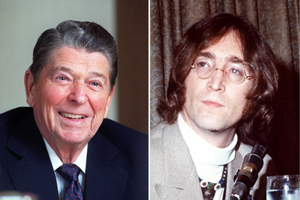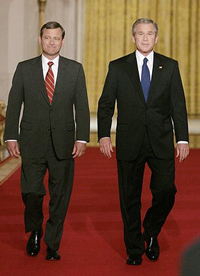
You’re welcome to send your Live Wire news tips or suggestions to [email protected].
Today’s Live Wire: Quick Links
- John Mica’s Pork Obsession
- Best Japanese Ad Ever
- End of the Space Age
- John Lennon, a Reagan Fan?
- End of the Symphony Orchestra
- Sex, Love, Loneliness: Internet
- What’s a Teabagger?
- Gmail’s New Look: A Preview
- The Activist Supreme Court
- History of English in 10 Minutes
- A Few Good Links
![]()
![]()
 From The Times: “With a price tag of $1.2 billion at completion, the rail line is expected to serve just 2,150 commuters a day when it starts operating in three years. It will not link to the Orlando airport or Disney World, among the region’s biggest traffic generators. Florida’s governor is even considering killing the project, worried that local government officials will rebel if they have to cover any shortfalls at the fare box. But the so-called SunRail project has survived, at least so far, a testament to the ability of one congressman to help push through hundreds of millions of dollars in federal spending, even at a time of deep concern over ballooning federal deficits. Representative John L. Mica, a Florida Republican and chairman of the House Transportation and Infrastructure Committee, has spent years badgering federal agencies, bullying state officials, blocking Amtrak naysayers and trying to bypass federal restrictions to build support and squash opposition to the commuter line. […] But skeptics question whether Mr. Mica’s real goal is to give a taxpayer-financed gift to CSX, the freight rail giant and a generous Mica campaign donor, which would get $432 million for its tracks and for upgrades to tracks it owns elsewhere in the state. Other Florida businesses close to Mr. Mica also stand to benefit if the project is built. […] Campaign finance records show that many of the contractors that worked on the project, including an engineering firm, Parsons Brinckerhoff, have been major contributors to Mr. Mica’s re-election campaigns. So have businesses and individuals who could benefit from the project, including ICI Homes, a real estate developer that owns several sites close to a proposed SunRail station, and Florida Hospital in Orlando, whose $250 million expansion plan is contingent on getting a station on its property. Executives at ICI Homes, or their relatives, have contributed nearly $70,000 to Mr. Mica over the last decade. An additional $35,000 in donations have come from staff members and lawyers at GrayRobinson, a Florida law firm lobbying for the project.” The full story.
From The Times: “With a price tag of $1.2 billion at completion, the rail line is expected to serve just 2,150 commuters a day when it starts operating in three years. It will not link to the Orlando airport or Disney World, among the region’s biggest traffic generators. Florida’s governor is even considering killing the project, worried that local government officials will rebel if they have to cover any shortfalls at the fare box. But the so-called SunRail project has survived, at least so far, a testament to the ability of one congressman to help push through hundreds of millions of dollars in federal spending, even at a time of deep concern over ballooning federal deficits. Representative John L. Mica, a Florida Republican and chairman of the House Transportation and Infrastructure Committee, has spent years badgering federal agencies, bullying state officials, blocking Amtrak naysayers and trying to bypass federal restrictions to build support and squash opposition to the commuter line. […] But skeptics question whether Mr. Mica’s real goal is to give a taxpayer-financed gift to CSX, the freight rail giant and a generous Mica campaign donor, which would get $432 million for its tracks and for upgrades to tracks it owns elsewhere in the state. Other Florida businesses close to Mr. Mica also stand to benefit if the project is built. […] Campaign finance records show that many of the contractors that worked on the project, including an engineering firm, Parsons Brinckerhoff, have been major contributors to Mr. Mica’s re-election campaigns. So have businesses and individuals who could benefit from the project, including ICI Homes, a real estate developer that owns several sites close to a proposed SunRail station, and Florida Hospital in Orlando, whose $250 million expansion plan is contingent on getting a station on its property. Executives at ICI Homes, or their relatives, have contributed nearly $70,000 to Mr. Mica over the last decade. An additional $35,000 in donations have come from staff members and lawyers at GrayRobinson, a Florida law firm lobbying for the project.” The full story.
See Also:
- The Sentinel’s Mica Endorsement Over Beaven: Pork Is Good As Long As It’s Our Pork
- Flagler Commissioners Endorse SunRail As Gov. Scott Prepares to Derail Commuter Line
CBS’s The Feed declared the following ad the best ever, all around, not just in Japan: “It’s almost too good to be real. These two Nissin Cup Noodle commercials from 1992 show James Brown adapting his classic “Sex Machine” to sell miso soup. But you already knew that. Because you’ve already watched this video over and over. Because it’s the greatest thing ever.”
From The Economist: “2011 might, in the history books of the future, be seen as the year when the space cadets’ dream finally died. It marks the end of America’s space-shuttle programme, whose last mission is planned to launch on July 8th (see article, article). The shuttle was supposed to be a reusable truck that would make the business of putting people into orbit quotidian. Instead, it has been nothing but trouble. Twice, it has killed its crew. If it had been seen as the experimental vehicle it actually is, that would not have been a particular cause for concern; test pilots are killed all the time. But the pretence was maintained that the shuttle was a workaday craft. The technical term used by NASA, “Space Transportation System”, says it all. But the shuttle is now over. The ISS is due to be de-orbited, in the inelegant jargon of the field, in 2020. Once that happens, the game will be up. There is no appetite to return to the moon, let alone push on to Mars, El Dorado of space exploration. The technology could be there, but the passion has gone—at least in the traditional spacefaring powers, America and Russia. […] With luck, robotic exploration of the solar system will continue. But even there, the risk is of diminishing returns. Every planet has now been visited, and every planet with a solid surface bar Mercury has been landed on. Asteroids, moons and comets have all been added to the stamp album. Unless life turns up on Mars, or somewhere even more unexpected, public interest in the whole thing is likely to wane. And it is the public that pays for it all.” The full piece.
See Also:
- Good Riddance: How the Shuttle and the Space Station Crippled America’s Space Program
- Endeavour Arcs Beyond Flagler Beach and Into History As Throngs Squint Goodbye
 Andrew Romano in the Daily Beast: “According to Fred Seaman, who worked for Lennon from February 1979 until he was shot and killed by a deranged fan on December 8, 1980, the counterculture icon who once asked us to imagine a world without organized religion, personal property, or national sovereignty was, in fact, a secret Ronald Reagan fan. […] By 1980, Lennon had long since soured on the radical leftist politics of his youth, telling Playboy’s David Sheff in his last major interview that he “dabbled in so-called politics in the late ’60s and ’70s more out of guilt than anything. Guilt for being rich, and guilt thinking that perhaps love and peace isn’t enough and you have to go and get shot or something, or get punched in the face, to prove I’m one of the people. I was doing it against my instincts.” Disillusioned with harsh, overreaching Yippies like Jerry Rubin and Abbie Hoffman, Lennon now emphasized individual responsibility rather than collective political action. “Produce your own dream,” he told Sheff. “If you want to save Peru, go save Peru. It’s quite possible to do anything, but not if you put it on the leaders and the parking meters. Don’t expect Carter or Reagan or John Lennon or Yoko Ono or Bob Dylan or Jesus Christ to come and do it for you. You have to do it yourself.” Lennon’s self-reliant streak made him skeptical of pop-culture charity efforts–and even foreign aid. When Sheff pointed out that a Beatles reunion could raise “$200 million [for] a poverty-stricken country in South America,” Lennon balked. “I am not going to get locked in that business of saving the world on stage,” he said. […] So is it possible that Lennon liked Reagan more than Carter? Sure (although the anti-war side of him would have tired of the Gipper’s martial rhetoric). The problem is that it’s absolutely impossible to infer from such speculation that the former Beatle possessed a cohesive political worldview–to claim, in other words, that he was “a conservative” (or for that matter, “a liberal”).” The full story.
Andrew Romano in the Daily Beast: “According to Fred Seaman, who worked for Lennon from February 1979 until he was shot and killed by a deranged fan on December 8, 1980, the counterculture icon who once asked us to imagine a world without organized religion, personal property, or national sovereignty was, in fact, a secret Ronald Reagan fan. […] By 1980, Lennon had long since soured on the radical leftist politics of his youth, telling Playboy’s David Sheff in his last major interview that he “dabbled in so-called politics in the late ’60s and ’70s more out of guilt than anything. Guilt for being rich, and guilt thinking that perhaps love and peace isn’t enough and you have to go and get shot or something, or get punched in the face, to prove I’m one of the people. I was doing it against my instincts.” Disillusioned with harsh, overreaching Yippies like Jerry Rubin and Abbie Hoffman, Lennon now emphasized individual responsibility rather than collective political action. “Produce your own dream,” he told Sheff. “If you want to save Peru, go save Peru. It’s quite possible to do anything, but not if you put it on the leaders and the parking meters. Don’t expect Carter or Reagan or John Lennon or Yoko Ono or Bob Dylan or Jesus Christ to come and do it for you. You have to do it yourself.” Lennon’s self-reliant streak made him skeptical of pop-culture charity efforts–and even foreign aid. When Sheff pointed out that a Beatles reunion could raise “$200 million [for] a poverty-stricken country in South America,” Lennon balked. “I am not going to get locked in that business of saving the world on stage,” he said. […] So is it possible that Lennon liked Reagan more than Carter? Sure (although the anti-war side of him would have tired of the Gipper’s martial rhetoric). The problem is that it’s absolutely impossible to infer from such speculation that the former Beatle possessed a cohesive political worldview–to claim, in other words, that he was “a conservative” (or for that matter, “a liberal”).” The full story.
See Also:
 From Standpoint: “Like a condemned man on a guillotine that jams in mid-fall, the symphony orchestra appears to survive on a whim and a prayer. The past year has been a testing one, the most parlous in memory, and few orchestras go into the summer festival whirl feeling entirely secure about what lies beyond. […] The United States sustains half the world’s 500 or so professional orchestras. After decades of conservatism, the floodgates finally broke last winter. Symphony orchestras in Honolulu, Syracuse (NY) and Bellevue (WA) went into liquidation. Detroit toughed out a six-month strike before musicians finally accepted a 22 per cent pay cut; some of the best players have since left town. Louisville went into bankruptcy protection with a view to cutting the orchestra to chamber size; Columbus, Ohio, has halved its band. And then came the bombshell. In March, Philadelphia, the first US orchestra to earn world fame in the 1920s when Leopold Stokowski conducted and Rachmaninov gave premieres, went into Chapter 11 bankruptcy to fend off its creditors. Philadelphia is — with Boston, Chicago, Cleveland and New York — one of America’s big five orchestras, so designated for the power of their playing and the depth of their financial endowment, built over a century. The Philadelphia sound was once held to be the acme of musical perfection, a symbol of what musicians could achieve in a free society. […] Any competent historian would tell you that the crunch has been a long time coming. Symphony orchestras, evolving in the 1830s to meet subsistence needs of urban musicians and a rising demand for entertainment from a growing middle class, started out by playing music that was fresh and new. […] Heavily dependent on local donors, themselves of advancing age, orchestras carried on playing Brahms, Schumann and Dvorak, music of a distant past, accentuating their geriatric profile. Musicians, fearful for their jobs, adopted a hard-hat unionism that won them $100,000 starting pay for a 20-hour week in the Big Five, unaffordable when the market crashed. Attitudes have since hardened into confrontation. Only in American orchestras do I hear well-meaning executives referred to as “management”, the natural enemy.” The full story.
From Standpoint: “Like a condemned man on a guillotine that jams in mid-fall, the symphony orchestra appears to survive on a whim and a prayer. The past year has been a testing one, the most parlous in memory, and few orchestras go into the summer festival whirl feeling entirely secure about what lies beyond. […] The United States sustains half the world’s 500 or so professional orchestras. After decades of conservatism, the floodgates finally broke last winter. Symphony orchestras in Honolulu, Syracuse (NY) and Bellevue (WA) went into liquidation. Detroit toughed out a six-month strike before musicians finally accepted a 22 per cent pay cut; some of the best players have since left town. Louisville went into bankruptcy protection with a view to cutting the orchestra to chamber size; Columbus, Ohio, has halved its band. And then came the bombshell. In March, Philadelphia, the first US orchestra to earn world fame in the 1920s when Leopold Stokowski conducted and Rachmaninov gave premieres, went into Chapter 11 bankruptcy to fend off its creditors. Philadelphia is — with Boston, Chicago, Cleveland and New York — one of America’s big five orchestras, so designated for the power of their playing and the depth of their financial endowment, built over a century. The Philadelphia sound was once held to be the acme of musical perfection, a symbol of what musicians could achieve in a free society. […] Any competent historian would tell you that the crunch has been a long time coming. Symphony orchestras, evolving in the 1830s to meet subsistence needs of urban musicians and a rising demand for entertainment from a growing middle class, started out by playing music that was fresh and new. […] Heavily dependent on local donors, themselves of advancing age, orchestras carried on playing Brahms, Schumann and Dvorak, music of a distant past, accentuating their geriatric profile. Musicians, fearful for their jobs, adopted a hard-hat unionism that won them $100,000 starting pay for a 20-hour week in the Big Five, unaffordable when the market crashed. Attitudes have since hardened into confrontation. Only in American orchestras do I hear well-meaning executives referred to as “management”, the natural enemy.” The full story.
See Also:
- On Unexpectedly Historic Night, Jacksonville Symphony Celebrates America in Palm Coast
- Cultural Development Richer Than Economic: How to Grow Palm Coast Into a City With Soul
Sex, Love, Loneliness: Internet
 From The New Yorker: “The process of selecting and securing a partner, whether for conceiving and rearing children, or for enhancing one’s socioeconomic standing, or for attempting motel-room acrobatics, or merely for finding companionship in a cold and lonely universe, is as consequential as it can be inefficient or irresolute. Lives hang in the balance, and yet we have typically relied for our choices on happenstance—offhand referrals, late nights at the office, or the dream of meeting cute. Online dating sites, whatever their more mercenary motives, draw on the premise that there has got to be a better way. They approach the primeval mystery of human attraction with a systematic and almost Promethean hand. They rely on algorithms, those often proprietary mathematical equations and processes which make it possible to perform computational feats beyond the reach of the naked brain. Some add an extra layer of projection and interpretation; they adhere to a certain theory of compatibility, rooted in psychology or brain chemistry or genetic coding, or they define themselves by other, more readily obvious indicators of similitude, such as race, religion, sexual predilection, sense of humor, or musical taste. There are those which basically allow you to browse through profiles as you would boxes of cereal on a shelf in the store. Others choose for you; they bring five boxes of cereal to your door, ask you to select one, and then return to the warehouse with the four others. Or else they leave you with all five. […] Match.com, one of the first Internet dating sites, went live in 1995. It is now the biggest dating site in the world and is itself the biggest aggregator of other dating sites; under the name Match, it owns thirty in all, and accounts for about a quarter of the revenues of its parent company, I.A.C., Barry Diller’s collection of media properties. In 2010, fee-based dating Web sites grossed over a billion dollars. […] So, for the purposes of this story, I didn’t do any online dating of my own. Instead, I went out for coffee or drinks with various women who, according to their friends, had had extraordinary or, at least, numerous adventures dating online. To the extent that a date can sometimes feel like an interview, these interviews often felt a little like dates. We sized each other up. We doled out tidbits of immoderate disclosure.” The full story.
From The New Yorker: “The process of selecting and securing a partner, whether for conceiving and rearing children, or for enhancing one’s socioeconomic standing, or for attempting motel-room acrobatics, or merely for finding companionship in a cold and lonely universe, is as consequential as it can be inefficient or irresolute. Lives hang in the balance, and yet we have typically relied for our choices on happenstance—offhand referrals, late nights at the office, or the dream of meeting cute. Online dating sites, whatever their more mercenary motives, draw on the premise that there has got to be a better way. They approach the primeval mystery of human attraction with a systematic and almost Promethean hand. They rely on algorithms, those often proprietary mathematical equations and processes which make it possible to perform computational feats beyond the reach of the naked brain. Some add an extra layer of projection and interpretation; they adhere to a certain theory of compatibility, rooted in psychology or brain chemistry or genetic coding, or they define themselves by other, more readily obvious indicators of similitude, such as race, religion, sexual predilection, sense of humor, or musical taste. There are those which basically allow you to browse through profiles as you would boxes of cereal on a shelf in the store. Others choose for you; they bring five boxes of cereal to your door, ask you to select one, and then return to the warehouse with the four others. Or else they leave you with all five. […] Match.com, one of the first Internet dating sites, went live in 1995. It is now the biggest dating site in the world and is itself the biggest aggregator of other dating sites; under the name Match, it owns thirty in all, and accounts for about a quarter of the revenues of its parent company, I.A.C., Barry Diller’s collection of media properties. In 2010, fee-based dating Web sites grossed over a billion dollars. […] So, for the purposes of this story, I didn’t do any online dating of my own. Instead, I went out for coffee or drinks with various women who, according to their friends, had had extraordinary or, at least, numerous adventures dating online. To the extent that a date can sometimes feel like an interview, these interviews often felt a little like dates. We sized each other up. We doled out tidbits of immoderate disclosure.” The full story.
See Also:
 From The Week: “Was President Obama speaking derogatively when he referred to the Tea Party as “tea baggers”? That’s the topic of some debate after a review of Jonathan Alter’s book, The Promise: President Obama, Year One, revealed that Obama used the term in November 2009. The grassroots movement didn’t always consider “tea bagger” a slur: Early Tea Partiers innocently embraced the term until they discovered its vulgar connotations (see also the 1998 John Waters movie Pecker). In a twist, some conservatives have recently advocated that the word be reclaimed. Here’s a look at the evolution of the insult,” week by week.
From The Week: “Was President Obama speaking derogatively when he referred to the Tea Party as “tea baggers”? That’s the topic of some debate after a review of Jonathan Alter’s book, The Promise: President Obama, Year One, revealed that Obama used the term in November 2009. The grassroots movement didn’t always consider “tea bagger” a slur: Early Tea Partiers innocently embraced the term until they discovered its vulgar connotations (see also the 1998 John Waters movie Pecker). In a twist, some conservatives have recently advocated that the word be reclaimed. Here’s a look at the evolution of the insult,” week by week.
See Also:
- Taking Back America–from Tea Party Phonies
- “You Smirked, Mr. Chairman”: Tea Party Puts County Commission On Notice
- Festive Fears and Cheers at Tea Party Rally

See Also:
- Google Is Giving Gmail a Makeover
- How to Get and Stay on Top of Your Email Easily by Dealing with It Tomorrow

Both were classic demonstrations of what the “Ashwander rules” were meant to discourage. In 1936, when a Court majority stretched its judicial muscles in Ashwander v. Tennessee Valley Authority to decide unnecessariliy a constitutional issue, Justice Louis Brandeis protested, and laid down a set of guidelines — quoted endlessly after that by cautious jurists — against deciding a constitutional issue when not necessary to resolve a case. A whole theory of “constitutional avoidance” has built up around the “Ashwander rules.”
It is apparent, at the close of this past Term, that the Roberts Court has not given up the temptation to which it yielded in in the school cases and the corporate campaign spending case. The examples are quite vivid.” The full analysis.
See Also:
- Executive Overreach? Supreme Court Considers Rick Scott’s Rule-Making Powers
- Florida’s Death Penalty Ruled Unconstitutional
Independence Day Special: History of the English Language in 10 Minutes
Part 1
Part 2
Part 3
Part 4
Part 5
Part 6:
Part 7
Part 8
Part 9
Part 10
See Also:
- Gerrymandering
- Emerson: The American Scholar
- N-Word Reckonings: Wrestling With ‘Nigger’ In and Out of Context
- The spell is broken: What will replace Harry Potter?
- Can the Gay Bar Survive?
- Magazines: Givin’ It All Away
- Bill Moyers is liberal journalism’s fickle godfather
- Chess Cheaters
- Bin Laden document trove reveals strain on al-Qaeda































rickg says
The Lennon story is really a stretch. The proponents of this information must have been smoking the same things John and Yoko did. And that wasn’t one of Mr. Reagan’s strong points as you may have heard…. Just say no… And I think when it comes to an accurate understanding of John I would look to Yoko and Sean.